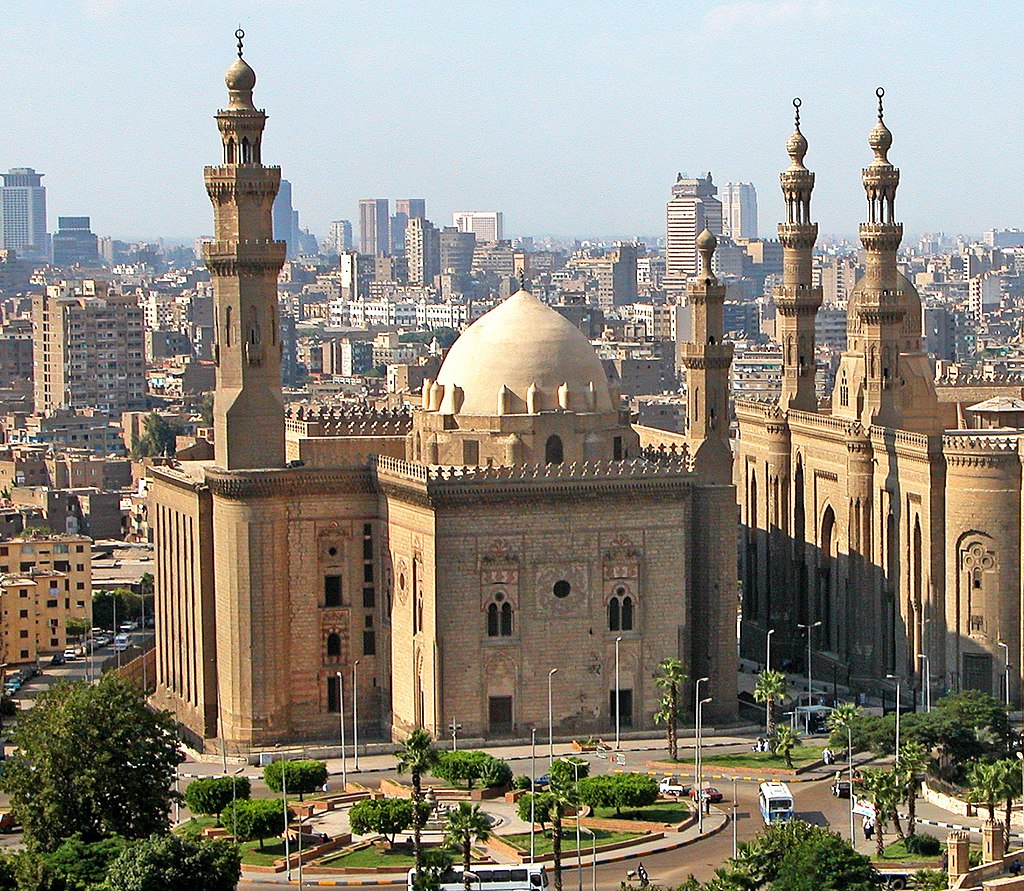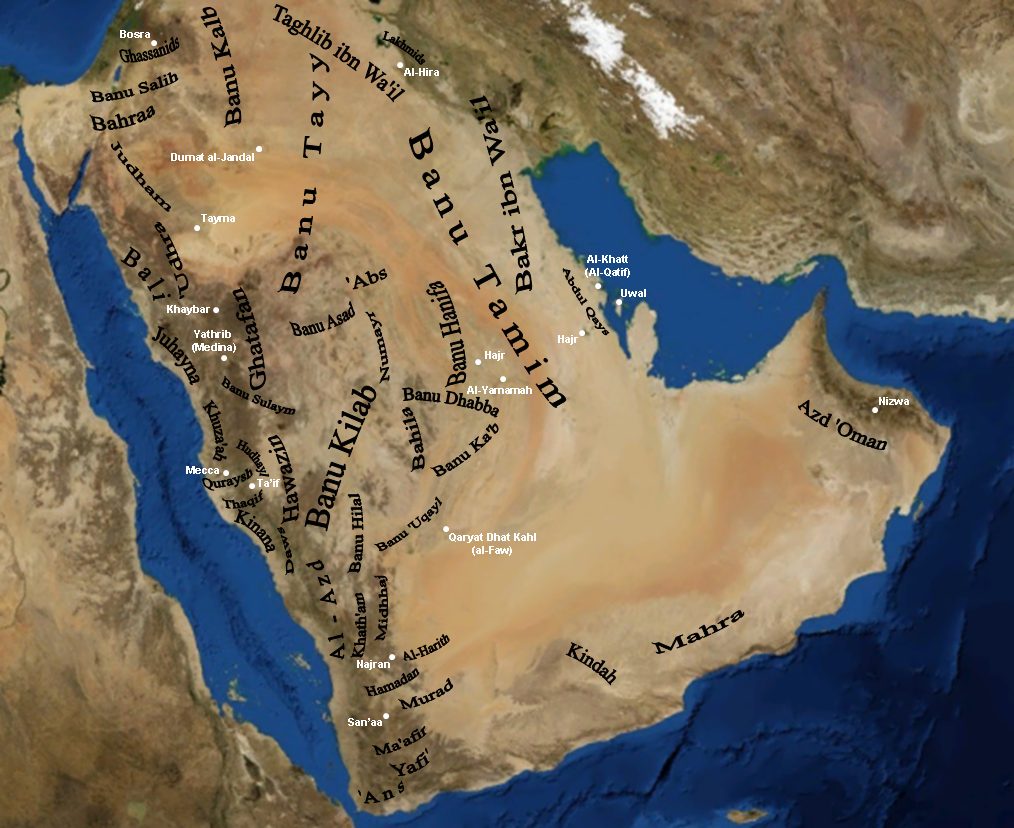The following is an excerpt (pages 312-316) from Ancient and Medieval History (1946) by Francis S. Betten, S.J. Although some information may be outdated, the Catholic historical perspective it provides remains pertinent. Use the link at the bottom of post to read the previous/following pages. Use the Search box above to find specific topics or browse using the Resources tab above.
CHAPTER XXX
THE MOHAMMEDAN PERIL
We have seen the foreign nations enter the Roman Empire and become its owners and rulers. These tribes submitted to the sway of the Christian religion. Another nation rose outside of the boundaries of the old Roman world, a nation with a new creed, which threatened destruction to both the culture and the religion of Christian Europe.
MOHAMMED AND MOHAMMEDANISM
419. Mohammed. — About a century after Clovis built up the empire of the Franks, a mighty power arose in far-off Arabia — a region until then beyond the pale of history. Arabia is mainly a desert, with occasional small oases, and some strips of tillable soil near the Red Sea. The best tribes of the Arabs or Saracens are related to the Jews and Assyrians. Some noble traits in their character notwithstanding, they were given to a low kind of idolatry which was connected with hideous excesses. The few cities near the Red Sea, on the road between India and Europe, practiced arts and carried on commerce. The rest of the Arabs were wandering shepherds — poor and ignorant, dwelling in black camel’s-hair tents, living from their sheep and by robbing their neighbors.
Mecca, the most important of the cities, was the birthplace of Mohammed, the man destined to make Arabia for centuries a world power. He is described as of a retiring disposition and religious inclinations and subject to epileptic fits. Until forty he led the life of an influential merchant, but withdrew every year for some time into the desert, where he devoted himself to pious meditations. On his business tours he had picked up bits of information concerning Christianity and Judaism. Finally he claimed to have had an apparition of the Archangel Gabriel, who, he said, announced to him that he, Mohammed, was the great prophet foretold by Moses. This was the beginning of the new religion, which he worked out further in the course of his life. For almost every phase and feature of it he claimed a special revelation.

The cupola is characteristic of these Mohammedan temples. From the slender towers, called “minarets,” the faithful are summoned to prayer by the voice of a “muezzin.” (The Mohammedans hate bells.)
420. Mohammedanism. — In comparison with the confusion and degradation of the Arabic religions, Mohammed’s system represented a partial progress. The chief article of his creed is that “there is One God, ‘Allah,’ and Mohammed is His Prophet.” The service of Allah is Islam, and those that profess it call themselves Moslem. They deny the Blessed Trinity, and hold that Moses and Christ were minor prophets sent to prepare the world for the coming of Mohammed. Prayer five times a day, a pilgrimage to Mecca once during lifetime, fasting during the entire month Ramadan, and almsgiving are enjoined. Faithful Mohammedans rigidly submit to these laws. But strangely in contrast with this emphasis on good works is their “fatalism,” the doctrine that nobody can change the fate once destined for him or for anything else. The true Moslem will go to a heaven of sensual pleasures. There is a terrible hell for the bad. Polygamy is allowed; the husband may divorce his wives for almost any reason, but a wife cannot leave her husband. The prophet himself, after the death of his first wife, married several. A sure way to paradise is war against the “infidels” (non-Mohammedans); “the sword is the key to heaven.” Friday is the sacred day. Mohammed’s teachings were collected, by his first successor, in a book called the Koran, the Mohammedan Bible. It is divided into 114 suras, or chapters, without any system or connection. Its numerous contradictions are one of the causes of the rise of many sects in Mohammedanism.
MOHAMMEDAN CONQUESTS
421. Rapid Expansion. — Mohammed’s closest intimates accepted him at once, but for the first twelve years he had few other converts. His townsfolk at Mecca jeered at his pretensions. The priests of the old religion roused the people against him, and at last drove him out of the city. His flight from Mecca to Medina, in 622, is called the Hegira. It is the point from which the Mohammedan world reckons the years, as does Christendom from the birth of Christ. (H. T. F. under “Era.”) Mohammed now made converts rapidly by means of the sword and soon captured Mecca, which became the sacred city of the faith. His fierce warriors were almost irresistible He himself was unscrupulous in the selection of means, so long as they served his ends. By the time of his death he ruled over all Arabia as Prophet and King, supreme in all matters, civil, military, and religious. This character descended to his successors, the caliphs. At the head of united Arabia, the caliphs began a career of conquest. They took Jerusalem, 638 A.D., and tore Palestine and Syria from the weak Eastern Empire. They destroyed the Persian kingdom, subjected Egypt, and by 700 A.D. their dominion extended from the Caucasus through Northern Africa to the Atlantic Ocean. Thus Europe was threatened from east and west.
The conquest of Christian territory did not mean that the entire population was at once forced to apostatize. Christians, however, who remained faithful to their religion had to pay an extra tribute and, as a matter of fact, were very frequently subjected to vexations and even cruel persecutions.
422. Two Great Repulses — In the East. — In 717 the Mohammedans appeared with a numerous force before Constantinople. The Emperor, Leo III, called the Isaurian, was a thorough-going Byzantine, imbued with the spirit of meddling with matters of ecclesiastical doctrine and discipline, and without any respect for the consciences and pockets of his subjects. But he was an energetic and able general. After a siege of twelve months the Mohammedans were forced to retire after immense losses, 718 A.D. This formidable menace to Christianity and Europe wore itself away on the walls of the city of Constantine.
In the West. — At nearly the same time the Arabs entered Spain and were soon masters of the West-Gothic kingdom (§ 394), which at this critical moment was torn by domestic dissensions. Only a few remote fastnesses in the north of the peninsula remained in the hands of valiant Christian defenders. Then crossing the Pyrenees, the Mohammedan flood spread over Gaul, even to the Loire. Now indeed it seemed “that the Crescent was about to round to the full.” But there was the powerful Frankish state under its able ruler, Charles Martel. The danger served to reunite it completely. The Duke of Aquitaine, who had long led a revolt against Frankish supremacy, threw himself upon Charles’ generosity and fled to him for aid. Under Charles’ leadership the Christian army met the foe, in 732 A.D., near Tours. From dawn to dark raged the fight. During the night the surviving Arabs stole in silent flight from their camp. Christianity and European civilization were again saved.
The repulses at Constantinople and Tours rank with Marathon, Salamis, Actium, and Chalons in the long struggle between Asia and Europe (§§ 119, 127, 305, 397). In point of high significance, however, the parallel with Châlons is the most complete. Tours and Constantinople, no less signally than Châlons, saved Christianity, the only true religion — the soul of the European civilization that was to be.
423. Mohammedanism after the Repulses. — For more than seven centuries Europe was safe. Mohammedanism soon split into two empires more or less hostile to each other. The caliph of the East built, for his capital, Bagdad on the Tigris, which soon became one of the richest cities of the world. The Caliphate of the West consisted chiefly of the Spanish peninsula with Cordova as capital.
424. Mohammedan Civilization. — Both capitals became centers of art and literature. In sculpture the Mohammedans did not accomplish much, because the Koran strictly prohibits any picture or statue. Their ornamentation consists chiefly of arabesques, i.e., fancifully interlaced lines, curved and straight. Many of their buildings are imposing. Famous are the Alhambra of Granada, and the former mosque, now cathedral, of Cordova, a vast building of nineteen naves.
Their literature is less important. Its most noted production is a collection of stories, the Thousand and One Nights. In spite of the prohibition of the Koran they studied the Greek philosophers, which Christian Syrians had translated into Arabic. It is in the Arabic translation that the books of Aristotle first became known to western Europe. (See § 620 and Ancient World, § 316.) But the original works of the Arabian philosophers are of little value. They transmitted to us our Arabic numbers and the science of algebra, which they had received from India. The same country furnished to them a better system of medicine, which they improved by introducing the experimental method. They studied and in some points improved the mathematical and astronomical works of the Greeks. Many of the technical terms referring to these sciences are Arabic.
Still, the genius of the Arabic nation is, on the whole, not creative. In later times political leadership fell to races still less capable of civilization, like the Turks. Fatalism, slavery, and the degradation of woman by polygamy and its consequences were other obstacles to genuine progress. Mohammedan culture, despotic, uniform, stagnant, was sure to be outrun by the rude but progressive civilization of western Europe.


